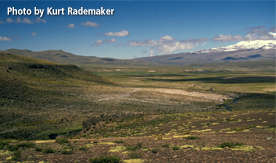
UMaine Doctoral Graduate Receives International Prize for Studying First Human Settlement in Peruvian Andes
A University of Maine alumnus and faculty associate in the Department of Anthropology recently won an international prize for his ice age research related to the first human settlement in the high Peruvian Andes.
Kurt Rademaker, who is also an associate graduate faculty member at UMaine’s Climate Change Institute, won the Tübingen Research Prize in Early Prehistory and Quaternary Ecology. The award is open to recent doctoral recipients around the world in a variety of areas including archaeology, ecology and human evolution.
The goal of Rademaker’s research is to better understand the timing, environmental setting and adaptations related to the early settlement.
“Human colonization of the Americas was the most rapid and extensive geographic expansion in our species’ history, in which hunter-gatherers successfully settled some of the most challenging environments on Earth,” he says.
Rademaker and his team discovered humans lived at 14,700 feet elevation in southern Peru about 12,000–12,500 years ago, making the Andes settlements the highest known ice-age archaeological sites in the world.
“The fact that hunter-gatherers were physiologically capable of living in high-altitude mountains at the end of an ice age is an example of how amazingly adaptable our species is. My team and I are trying to learn more about how people managed this initial settlement and how Andean environments, ecology and culture have changed since then,” he says.
Rademaker collaborates with researchers from throughout the United States, Canada, Peru, Chile and Germany.
“Many different skill sets are needed to do interdisciplinary work, and archaeology is labor-intensive, so this means building teams of people with varied specializations,” he says.
Rademaker considers his work somewhat nontraditional because he uses an interdisciplinary systems approach that combines archaeology and other earth science techniques to investigate the long-term evolution of landscapes in which people play an important role.
Rademaker and his team can sometimes estimate the age of settlements by tools found at sites. Other times the researchers excavate areas in rockshelter sites used as camps and retrieve organic material such as animal bones that people discarded then radiocarbon date the bones to determine their approximate age.
Research conducted by Rademaker and his team suggests that the first people in the Peruvian Andes settlements hunted Andean camelids — ancestors of today’s alpacas and llamas — and Andean deer. The people may have also eaten plants, but a complete picture of their diet awaits further study, Rademaker says.
“One interesting finding is that there are stone tools in the shelter that do not come from the highlands but from lower-elevation canyons,” Rademaker says. “So these people may have been moving between low and high elevations, perhaps seasonally.”
The Tübingen Research Prize is administered by the Department of Early Prehistory and Quaternary Ecology housed in the Institute for Pre- and Protohistory and Archaeology of the Middle Ages at the Eberhard Karls University in Tübingen, Germany. The prize, in its 16th year, was created to promote innovative research among scholars studying ice age archaeology, Quaternary ecology and human evolution.
“It is such a great honor to win this award,” Rademaker says. “Tübingen has one of the premier archaeological departments in the world. The Department of Early Prehistory and Quaternary Ecology is renowned for its archaeological sciences expertise and groundbreaking work on human prehistory and evolution throughout Africa, Asia and Europe.”
In accepting the award, Rademaker is slated to deliver the prize lecture Feb. 6 at the Fürstenzimmer of Schloss Hohentübingen, where he will receive 5,000 Euros ($6,800). As the winner, he is also expected to contribute a research paper summarizing the major aspects of his research for the journal Mitteilungen der Gesellschaft für Urgeschichte.
“I have lots of ideas for future research, so I hope to have the opportunity to continue in academic archaeology,” Rademaker says.
Rademaker has been researching early human settlements in the high Peruvian Andes for about 10 years and has made 13 trips to Peru to complete his master’s and Ph.D. research.
“In total, I have spent about a year of my life camping in the high Andes while doing fieldwork,” he says.
Rademaker, who has been interested in the settlement of the Americas since he began his career in archaeology in 1996, became involved in Peruvian archaeology and climate change through the Climate Change Institute when he came to UMaine in 2003.
“I had the good fortune to have Dan Sandweiss as my graduate adviser,” Rademaker says. “Dan invited me on his field project in Peru in 2004, and I have been hooked on the Andes ever since.”
In 2008, Rademaker won the Society for American Archaeology’s Douglas C. Kellogg Geoarchaeology Award and the Geological Society of America’s Claude C. Albritton Archaeological Geology Award for research by a graduate student. Rademaker is the second person to win both awards and the only person to win them in the same year, according to his former adviser Sandweiss, the dean and associate provost for graduate studies and a professor of anthropology and quaternary and climate studies.
Rademaker earned a doctoral degree in Quaternary archaeology from UMaine in 2012 and a master’s degree in Quaternary and climate studies in 2006. He also holds a bachelor’s degree in anthropology from the University of Kentucky. He is expected to teach archaeology courses at UMaine during the spring semester.
“In addition to being a unique source of information about our own species’ development, archaeology also is a tremendous source of information about past climate and environmental change,” Rademaker says. “Future environmental change is the most serious challenge our civilization faces. Archaeology can help us understand the development of Earth’s landscapes and our current situation.”
Contact: Elyse Kahl, 207.581.3747
